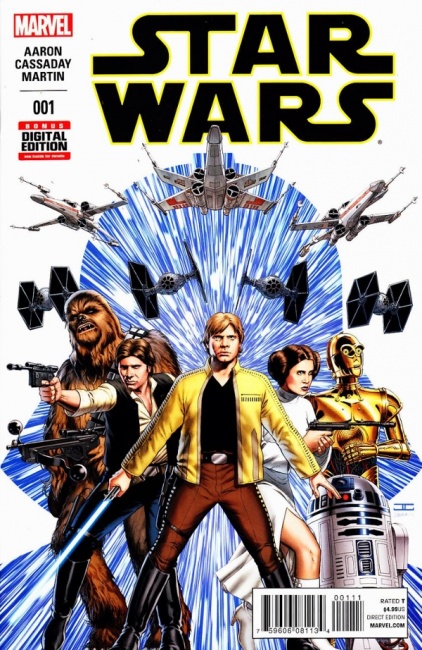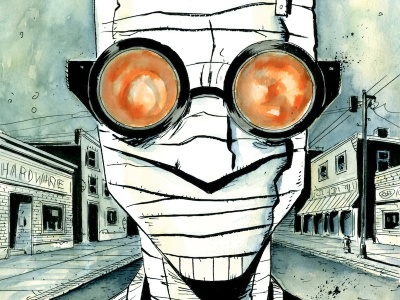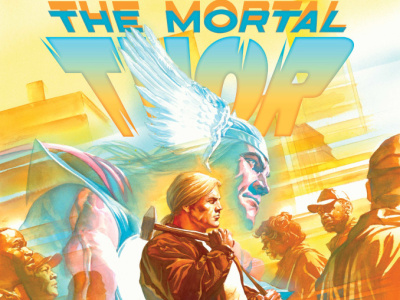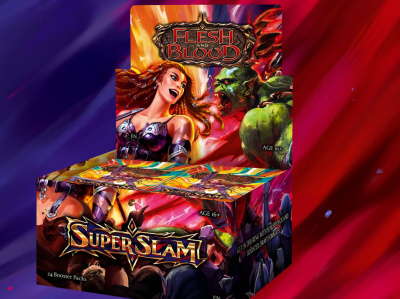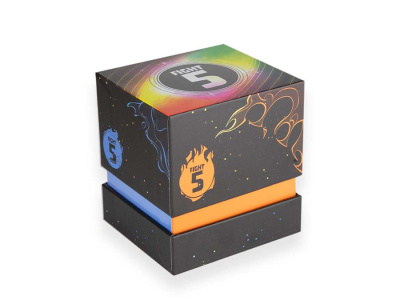ICv2 recently spoke with Marvel Publisher Dan Buckley to discuss the market and Marvel’s publishing strategies. In Part 3, we talk about Star Wars and Marvel’s publishing plans for its own universe in 2015. In Part 1, we talked about the market, Marvel’s place in it, Marvel’s comic package, and Marvel’s graphic novel strategy. And in Part 2, we talked about the changing audience for comics and the transmedia aspect of Marvel’s business.
We want to talk about Star Wars. The historical perception of Marvel has been that it’s great at managing its own universe, but when it gets involved in licensing, it’s not as good a fit. That changed somewhat; in recent years you’ve done things like the Stephen King books, so you’ve been more successful than in the past with licensed properties (see "See 'Dark Tower' Tops March Comics"). Can you talk about the difference in culture required to handle someone else’s characters vs. your own and how you think that’s going to go with Star Wars (see "Marvel Gets 'Star Wars''")?
I’m happy you picked Dark Tower, because I think that’s a good example of us doing a good job.
It is complicated, and I try to recognize that when we were trying to judiciously pick outside I.P. to bring into Marvel. I want to be very clear with you. We were very selective about what we brought in.
We generally picked stuff that we thought would align very well with going into hobby shops, that have their own geek culture and have continuity to them. We can lend some of our expertise in doing that, and we have an opportunity to own some visual representations of what’s being presented. I think we did a good job with Anita Blake for a while. (That just ran its course. We could have kept on publishing, we just both agreed that, "You know what, it probably got a little too sexy for us, so we should go our own ways.") We did a very good job with Dark Tower. We had a pretty successful run with the Halo outside universe, and Castle, we’ve done some books around that. Ender’s Game was another one I think we did a very good job with.
There was definitely a discussion on how to set up our mindset to deal with that. Marvel is traditionally not very strong with that because the publishing group in and of itself was the IP generator for Marvel. So as a work flow, in practice they just aren’t used to asking anybody’s permission to do stuff. And that is something that for a long time I don’t think people at Marvel were recognizing as the challenge. You need to slow down the mindset and make it clear to the editors and folks working on the project, "Hey, you have to be respectful. This is someone else’s I.P."
Ralph Macchio for Dark Tower and Nick Lowe for Ender’s Game--we really took a lot of time and care with our marketing and editorial staff to bring those people in and talk to us about what they wanted to get done and we learned a lot from that. It proved to be very beneficial as we develop our relationship with Lucasfilm on Star Wars.
We spend a lot of time with them because they’re navigating a lot of stuff themselves, like launching a movie (no pressure). We spend a lot of time talking to them, having story conferences on what we can and cannot do. [Editor] Jordan White is very involved in that. Our operations, marketing, sales, and editorial staffs have taken a lot of key learning from our Dark Tower, Halo, and Ender’s Game experiences. Our production timelines have to be different; we have to accept the fact that the approvals will take a little longer. That’s where we would trip ourselves up, because our guys would get in there and say, "Oh, we’ll just produce this like a Marvel comic." And you can’t. We accept that.
The unique situation for us with Star Wars is that strategically we’re the same company, so it’s very important for all parties to be happy and to be as successful as possible, because it reflects across a bunch of different places. I’m not selling short what we did with Ender’s Game or Dark Tower, but it does lend a different philosophy to the process.
It’s not just about paying somebody a royalty rate; this is about the holistic success of a franchise for our company and we want to do all we can to make Star Wars as successful as possible because that’s good for all of us. Star Wars is not a competing piece of IP for Marvel any more; it is a brother or sister IP. I don’t want to say complementary IP because we’re both what we are, and we’re going to compete, and we’re going to be aggressive with each other, but it behooves both parties for both things to be as successful as possible.
Will you go heavier into mass with Star Wars product than with Marvel, or about the same?
That will get dictated by the sales approach. It’s still early on. Like I said, Lucasfilm is juggling a lot of balls, which we’re working closely with them on. They just launched the animated series, which did very well. They’ve got the movie coming up.
I’m sure there’s going to be a lot of mass market opportunities coming up because let’s face it, another Star Wars movie coming out is a cultural event, not just a movie. The mass market opportunities for the comic book and graphic fiction experience are going to be elevated because [mass merchants] are going to look at it and say, "This is going to be a good piece to have in here." And we have a lot of good relationships with people who want to do that. So I would guess that there are going to be mass market opportunities just from the nature of what we’re dealing with.
David Gabriel provided the following additional information after the interview via e-mail:
"We’re doing Star Wars comic product: four titles right now, Star Wars, Darth Vader, Princess Leia, and Kanan: The Last Padawan. We’ll also have a robust backlist of Epic collections, Omnibus, and re-mastered graphic novels. These will be available in all regular comic channels, book channels, and a few other new outlets that we’ll be revealing in the coming weeks. Our digital selection will be as robust as the new current titles and backlist that we’re offering in print."
What are you most excited about coming from Marvel in 2015?
We’re excited about Age of Ultron. I know what’s going on with Ant-Man and I’m very excited about that. We have the television shows and animated series that are all doing very well for us. I couldn’t be happier with S.H.I.E.L.D. right now from a storytelling standpoint. Agent Carter’s going to be a lot of fun.
From a publishing standpoint, I couldn’t be more excited about Secret Wars (see "Marvel Unveils 'Secret Wars' #1 Cover"). We’ve been working our way toward this for about four or five years now. [Jonathan] Hickman pitched this story when he took over The Avengers, so that’s how long we’ve been percolating on this, and the fact that we kept it secret until announcing at New York Comic Con--we’re still floored. We were talking about it at our editorial retreats for a long time. Two years ago it was back-burnered, and then a year ago it was, "It’s here, we have to start thinking about it."
The editorial and creative collaboration and buy-in is very exciting to see. I think it’s going to be very cool to see it all come together and how we can elevate the event across all our forms of business (which we’re doing), and it’s exciting to see publishing doing that. And then the things coming out the other side are exciting, too. I really can’t get much more into that part.
Civil War, I didn’t know how big it was going to be until it shipped. I knew it was cool, but it had a moment. It landed.
This has the opportunity to be a combination of Civil War and Age of Apocalypse, and that’s unique. I really appreciate everything being done editorially with the writers, artists, Tom Brevoortis losing his mind. Jonathan Hickman didn’t know what he got himself into when he said "I want to do this" five years ago. I couldn’t be more excited about what we’re going to do during that event and leading out of it.
Click here to go back to Part 1.
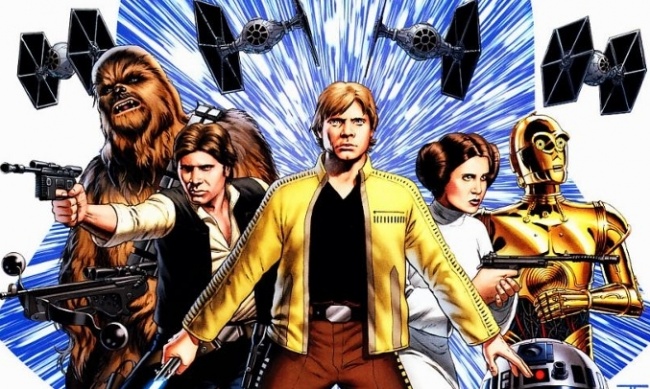
'Star Wars' and Marvel’s Plans for 2015
Posted by ICv2 on January 19, 2015 @ 3:58 am CT
MORE COMICS
Story Inspired by H.G. Wells' 'The Invisible Man' Returns in Hardcover
July 3, 2025
First published by Vertigo, Lemire’s reimagining of the classic H.G. Wells novel The Invisible Man will return in a new hardcover edition.
From Marvel Comics
July 3, 2025
Check out the first three covers of the new series, which sees the God of Thunder reborn as a mortal.
MORE NEWS
New 'Flesh & Blood TCG' Booster Set
July 3, 2025
Legend Story Studios announced Super Slam, a new Flesh & Blood TCG booster set.
New Riff of the Classic Game of War from Chip Theory Games
July 3, 2025
Chip Theory Games will release Fight Five, a new card game, into retail.



